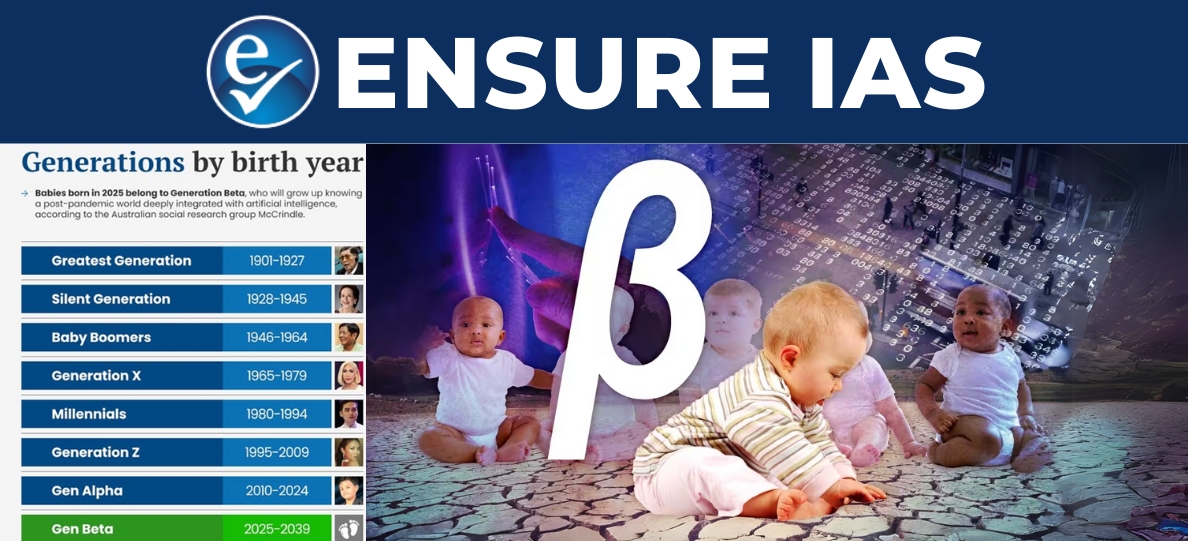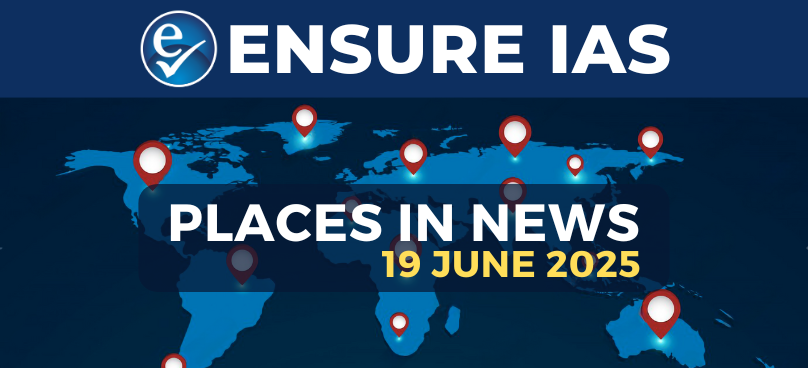- Courses
- GS Full Course 1 Year
- GS Full Course 2 Year
- GS Full Course 3 Year
- GS Full Course Till Selection
- Answer Alpha: Mains 2025 Mentorship
- MEP (Mains Enrichment Programme) Data, Facts
- Essay Target – 150+ Marks
- Online Program
- GS Recorded Course
- Polity
- Geography
- Economy
- Ancient, Medieval and Art & Culture AMAC
- Modern India, Post Independence & World History
- Environment
- Governance
- Science & Technology
- International Relations and Internal Security
- Disaster Management
- Ethics
- NCERT Current Affairs
- Indian Society and Social Issue
- NCERT- Science and Technology
- NCERT - Geography
- NCERT - Ancient History
- NCERT- World History
- NCERT Modern History
- CSAT
- 5 LAYERED ARJUNA Mentorship
- Public Administration Optional
- ABOUT US
- OUR TOPPERS
- TEST SERIES
- FREE STUDY MATERIAL
- VIDEOS
- CONTACT US
Generation Beta Era Began: India's first Gen Beta boy born in Aizawl
Generation Beta Era Began: India's first Gen Beta boy born in Aizawl
06-01-2025

- On January 1, 2025, the Generation Beta Era Began. Frankie, born at Synod Hospital in Durtlang, Aizawl, became the 1st baby in India to be part of Generation Beta.
- This marks the start of a new generational cohort (class or group) with unique characteristics and challenges.
What is Generation?
- Generational cohorts (group of people who are around the same age) are groups of people born within specific time frames, sharing similar cultural, economic, and social experiences that shape their collective identity.
- These cohorts help sociologists, marketers, and historians understand societal trends and behaviours over time.
- The practice of naming generations began in the early 20th century. One of the earliest named cohorts is the "Lost Generation," referring to those who came of age during World War I.
- Subsequent generations have been identified and named based on significant historical events, demographic trends, or cultural shifts.
Significance of Generational Naming
- Sociological Analysis: It allows researchers to study and compare behaviours, values, and trends across different age groups.
- Cultural Identity: Generational labels help individuals identify with broader societal groups, fostering a sense of belonging.
- Marketing and Economics: Businesses use generational data to tailor products and services to specific age demographics.
Who Is Generation Beta?
- Generation Beta refers to children born between 2025 and 2039. They will grow up in a world shaped by advanced technologies and global challenges. Key aspects of this generation include:
- Tech-Driven Upbringing: Immersion in artificial intelligence (AI), virtual reality (VR), and smart systems will be a defining feature of their lives.
- Global Connectivity: They will be highly connected and aware of worldwide issues.
- Unique Challenges: Mental health concerns, climate change, and navigating a digital-dominated world will be prominent.
- Significant Demographics: By 2035, they are expected to constitute 16% of the global population.
What Makes Generation Beta Unique?
- Tech-Savvy and Digitally Fluent: Generation Beta will seamlessly interact with cutting-edge technologies. Their daily lives may include:
- AI-powered learning tools and virtual classrooms.
- Autonomous vehicles and wearable health devices.
- Immersive experiences in the metaverse for education, socializing, and entertainment.
- Innovative and Adaptive: Living in a rapidly evolving digital landscape will enhance their resilience and drive their ability to innovate.
- Social Awareness and Inclusivity: A deeply connected global environment will encourage:
- Empathy and inclusiveness.
- Advocacy for diversity and the rejection of outdated societal norms.
- Environmentally Conscious: This generation is likely to adopt sustainable habits and actively support environmental policies to combat climate change.
What is the role Technology in Generation Beta’s Life?
-
Education
- Personalized Learning: AI tools will provide customized education but may affect creativity and critical thinking.
- Virtual Reality Classrooms: Interactive and immersive VR environments will redefine traditional learning.
-
Workplace
- Focus on Human Skills: Automation will shift the emphasis to roles requiring creativity and emotional intelligence.
- Global Collaboration: Connectivity will foster inclusive teamwork across different regions and age groups.
-
Instant Gratification and Adaptability
- Frequent use of AI and digital platforms may encourage instant gratification.
- However, their adaptability and innovation will help them thrive in this fast-paced environment.
Cultural and Social Impact
- Breaking Traditional Norms: Generation Beta will lead new cultural shifts:
- Inclusivity: Acceptance of diverse perspectives and lifestyles.
- Eco-Consciousness: Sustainability as a core value.
- Redefining Relationships: Technology will reshape personal and professional interactions, highlighting the need for strong emotional intelligence.
- Challenges to Tradition: Their progressive outlook may create generational conflicts, necessitating mutual understanding and open communication.
What challenges will Generation Beta face?
-
Mental Health and Digital Balance
- Screen Time Effects: Overexposure to digital platforms may lead to anxiety, social isolation, and low self-esteem.
- Resilience Building: Initiatives for mindfulness and emotional intelligence will be essential.
- Attention and Focus Issues: Digital immersion might hinder long-term focus and problem-solving skills.
-
Privacy and Ethics
- Data Privacy Concerns: Increased reliance on AI and VR raises questions about data security.
- Ethical Tech Use: Ensuring safety and ethical boundaries in the digital space will be crucial.
- Sustainability and Existential Anxiety: The urgency of climate change may cause existential stress, emphasizing the need for resilience programs.
The Evolution of Generations
|
Generation |
Time Period |
Key Characteristics |
|
The Silent Generation |
1925 - 1945 |
|
|
Baby Boomers |
1946 - 1964 |
|
|
Generation X |
1965 - 1980 |
|
|
Millennials (Generation Y) |
1981 - 1996 |
|
|
Generation Z |
1997 - 2012 |
|
|
Generation Alpha |
2013 - 2024 |
|
|
Generation Beta |
2025 -2039 |
|
|
Future Generation |
2040 - 2069 |
|
Preparing Generation Beta for the Future
- Emotional Intelligence and Mental Health: Encourage open communication and mindfulness.
- Set boundaries to balance screen time and real-world activities.
- Creativity and Critical Thinking: Promote hands-on learning to complement AI tools.
- Teach critical evaluation of AI biases and misinformation.
- Eco-Consciousness: Instill (inculcate) sustainable habits and environmental responsibility from a young age.
- Readiness for a Tech-Driven World: Ensure strong digital literacy and ethical awareness in technology use.
Long-Term Impact of Generation Beta
- Generation Beta will transform industries, governance, and sustainability. Their innovative and inclusive mindset will address global challenges like climate change and urbanization.
- Success will depend on their ability to balance technological reliance with human values.
Conclusion
Generation Beta represents a pivotal force in shaping the future. With the right guidance, they can lead the world towards a more inclusive, sustainable, and innovative future, leaving a lasting impact on society.
|
Also Read |
|



